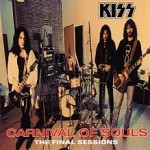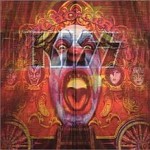[one_third][alert type=”blue”]
Released: October 28, 1997
Label: Mercury Records[/alert][/one_third]Though KISS had remained active touring internationally and staging KISS Konventions across America, it had been almost four years since the band had released Revenge, by far the longest period the band had gone since releasing an album. Side projects had been distracting the band in the same way they had in the mid ’80s with Gene’s film career and the late ’70s with all of the outside business ventures of the SuperKISS era. Finally, at the end of ’95, the band decided to finally commit itself to another album. Bob Ezrin was initially scheduled to produce the album but the band’s glacial pace at recording and other commitments caused him to leave the project.
In his place, KISS enlisted Toby Wright, a producer who had helped mix Crazy Nights and had gone on to work with hit artists of the day like Alice in Chains and Slayer. The bands he worked with were generally much heavier than KISS. Working with a producer known more for working with metal acts was a conscious decision on KISS. Current alt-rock acts like Smashing Pumpkins and Alice in Chains had cited KISS as an influence so many times that KISS decided to tip their cap towards them. In fact, the album opened with a shout out to Pumpkins front man Billy Corgan, which was masked by the record label.
The material on the album was by far KISS’ darkest and most introspective material in years if not ever. The album was unusually personal for a band that typically sang about good times and partying. Another unusual aspect of the album was the increased presence of longtime lead guitarist Bruce Kulick, who had writing credits on 9 out of the 12 songs and for the only time in his twelve year tenure with the band, got to take a turn on lead vocals with the power ballad “I Walk Alone”.
However, as the album was being prepped, KISS Unplugged debuted on MTV and the special became a surprise smash hit with the network airing it repeatedly for months on end. As word of mouth grew and rumors of a full blown reunion by the original lineup (with the make up) intensified, the band (especially Kulick) wondered what their strange new album’s place was in all of this. Gene Simmons always insisted that the album would come out in Spring of ’96, right after KISS Unplugged was released in March of that year. Those plans changed on February 28th, 1996 at the 38th Annual Grammys when the original four appeared in full makeup costume.
KISS had finally stopped trying to cave into trends and decided the best way to reclaim their power is to fully embrace the past. Weeks after the Grammys appearance, a full reunion tour across North America was announced for the Summer and Fall of ’96. The album was placed on the backburners and no one was sure if it would ever be released. Eventually, the album (dubbed Carnival of Souls by many fans) and was bootlegged widely by KISS fans. Reaction was divisive. Some bands liked to see the heavier, darker material while others were put off with it and thought KISS was trying to jump on the back of the grunge trend which was quickly fading by ’96.
For the vast majority of KISS’ reunion tour, Eric Singer and Bruce Kulick were given a weekly paycheck to standby in case Ace Frehley or Peter Criss reverted back to their old ways. Eventually at the end of 1996, Singer and Kulick were let go with Eric Singer going on to drum for KISS spiritual godfather, Alice Cooper and Bruce Kulick in an even more ironic move going on to form a band with John Corabi, a singer who had recently been booted out of Motley Crue where he had replaced Vince Neil as vocalist for four years in the mid ’90s.
Eventually, Mercury Records decided they didn’t want to keep an album they had spent hundreds of thousands sitting on the shelf forever. They and KISS decided it’d be good to make some money off the record before everybody had a bootleg copy. Taking a cue from the fans, the album titled Carnival of Souls: The Final Sessions was released in October of 1997 and debuted at #27 on the Billboard charts. The debut single “Jungle” (the longest song in the history of the band, clocking in at almost seven minutes) got some radio play on modern rock stations but other than that, the album quickly fizzled from the charts. Carnival of Souls gave hardcore fans something to discuss and debate before KISS “reunion” album came out in 1998 but was otherwise ignored.
So the era of the band’s “unmasked” era ended with not a bang but a whimper. Though it’s often derided by many (including most fans of the band), KISS run in the ’80s and early ’90s helped keep the band’s name alive. It may have never reached the heights of the ’70s hysteria but the band still managed to sell millions of albums during the era and for many, Bruce Kulick is the guitarist they identify with KISS not Ace Frehley and they loved Eric Carr (or Singer) just as much as the fans in the ’70s loved Peter Criss. Sadly, that era is mostly forgotten by even the band itself with very few of the songs represented in their live sets over the past fifteen years. Although many of the albums were terrible and their fashion choices were even worse, me and a few thousand weary souls will always proudly carry the torch for the non-make up era of KISS.
The Return of KISS… for real, this time!
[one_third][alert type=”blue”]
Released: September 22, 1998
Label: Mercury Records[/alert][/one_third]KISS’ reunion tour had revived their fortunes dramatically. After a warm up date at KROQ’s Weenie Roast in Southern California, they played their first show of the tour at Detroit’s Tiger Stadium in June of ’96. Detroit had always been a good home to the band even in the leanest times but during the reunion tour, they showed their appreciation in resounding fashion by snapping up the 47,000 tickets for the show within hours. Throughout the second half of ’96 and during the first half of ’97, KISS played sold out venues across the country. The band mocked for the past seventeen years for being out of touch were suddenly cool again.
Fans were thrilled at the prospect of a new KISS album with original lineup. And the band returned to the studios at the beginning of ’98. Unfortunately for members of the KISS Army, this would be no reunion album. Over the course of their comeback tour, old tensions in the band resurfaced. Ace Frehley’s wild ways were back and Peter Criss strongly resented being a mere employee of the band instead of a full fledged member. Paul Stanley had no intention of letting Ace & Peter play on the album and in fact paid them $750,000 not to play the album. Although Ace & Peter would make appearances on the album to keep up the “reunited and happy” guise, most of the lead guitar parts were played by Gene and Paul’s longtime assistant Tommy Thayer while session musician Kevin Valentine played the skins. The only track that all four members played on was Ace’s contribution “Within”, which Ace insisted that Peter play on. All four also contributed vocals to the album’s attempt at another “Rock N Roll All Night” called “You Wanted The Best”.
Gene and Paul attempted to recreate the majesty of Destroyer with a varied, “epic” sound. Producer Bruce Fairbairn had produced Aerosmith’s comeback albums in the late ’80s and was hoping to replicate that success. However, KISS was a house divided. The reunion which had rescued all four members from some degree of irrelevancy had also reignited all four men’s monstrous egos.
The “reunion” album Psycho Circus was released in September of ’98 and was met with a great deal of excitement. The album debuted at #3 on the Billboard Charts, KISS’ highest chart position to date. The title track for the album reached #1 on the Billboard Rock Tracks. However, after that initial success, KISS fans came to the realization that the album for the most part (outside of a few tracks) was just not very good.
KISS was no longer the young, hungry band that wanted to conquer the world. They were old, tired professionals, looking to churn out an album that they could sell at the merchandise stands for the next tour. Yes, KISS first official album with the original lineup since 1979 was treated as a “big deal” but it wasn’t as big of a deal as KISS Week on Fox (featuring guest appearances by the band on Millennium and MAD TV!) or their new concert tour with a 3D video screen! With Psycho Circus, KISS had been given a chance to reignite their career and have a big second act like Aerosmith and Bon Jovi had. But instead they lived up to all of the criticisms on them over the past eighteen years. They were a band that cared far more about trying to wring the last dollar out of their fans than creating a great album. Psycho Circus should have heralded the return of KISS, instead it was an album that was nearly as bad as stinkers like Hot in the Shade.
The initial magic of the reunion tour turned into monotony. With each ensuing tour, the enthusiasm waned and the tensions in the band intensified. To survive into the New Millennium, KISS couldn’t (just) rely on the same old tricks. They needed to prove why they were once the Hottest Band in the World even if it meant abandoning some of the members that had brought them to that state.
Next time on Connor’s KISS Korner: The phenomenon known as KISS enters the new millennium!

